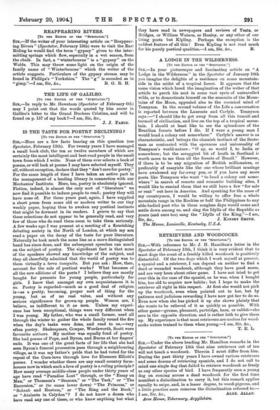IS THE TASTE FOR POETRY DECLINING ?
[TO THE EDITOR OP THE " SPECTATOR."]
Srn,—Here are a few facts bearing on this question (see Spectator, February 13th). For twenty years I have managed a small book club, the ten or twelve members of which are certainly the most intelligent and best-read people in the small town from which I write. None of them ever selects a book of poems, or will look at poems I may have selected myself. They all, without exception, declare that they " don't care for poetry." For the same length of time I have taken an active part in the management of a lending library in connection with our Mechanics' Institute. Here, too, poetry is absolutely ignored. Fiction, indeed, is almost the only sort of "literature" we now find it possible to induce people to read; poetry they will have none of. For three years past, again, I have supplied a short poem from some old or modern writer to our tiny weekly paper, hoping thus to awaken any poetical instincts that might be dormant in its readers. I grieve to say that these selections do not appear to be generally read, and very few of those who do read them seem to take them seriously. A few weeks ago I was present at a meeting of a flourishing debating society in the North of London, at which my son read a paper on the decay of the taste for pure literature. Naturally he took much the same line as a more distinguished hand has since done, and the subsequent speeches ran much on the subject of poetry. The significant fact is that none of the speakers showed any knowledge of the subject, and they all cheerfully admitted that the world of poetry was to them virtually a terra incognita. But you ask : How, then, account for the sale of poetical works ? What becomes of all the new editions of the poets ? I believe they are mostly bought for presents for young people, particularly for girls. I know that amongst my own acquaintances it is so. Poetry is regarded—much as a good deal of religion is—as a pretty, becoming, proper sort of thing for the young, but as of no real value, and without any serious significance for grown-up people. Women are, I believe, as indifferent to it as men. Unless my experi- ence has been exceptional, things were very different when I was young. My father, who was a small farmer, used all through the winter to gather the whole family round the fire when the day's tasks were done, and read to us,—very often poetry. Shakespeare, Cowper, Wordsworth, Scott were favourite authors. My mother was equally fond of poetry. She had poems of Pope, and Byron, and Burns at her fingers' ends. It was one of the great facts of her life that she had seen Byron's funeral procession pass through a neighbouring village, as it was my father's pride that he had voted for the repeal of the Corn-laws through love for Ebenezer Elliott's poems. I wonder whether there are any small country farm- houses now in which such a love of poetry is a ruling principle ? How many average middle-class people under thirty years of age have read "Paradise Lost" through, or the "Essay on Man," or Thomson's " Seasons," or " The Task," or " The Excursion," or (to come lower down) " The Princess," or " Solirab and Rustum," or " The Ring and the Book," or "Atalanta in Calydon"? I do not know a dozen who have read any one of these, or who know anything but what they have read in newspapers and reviews of Yeats, or Bridges, or William Watson, or Henley, or any other of our living poets but Kipling. Perhaps the exception is the saddest feature of all this ! Even Kipling is not read much










































 Previous page
Previous page